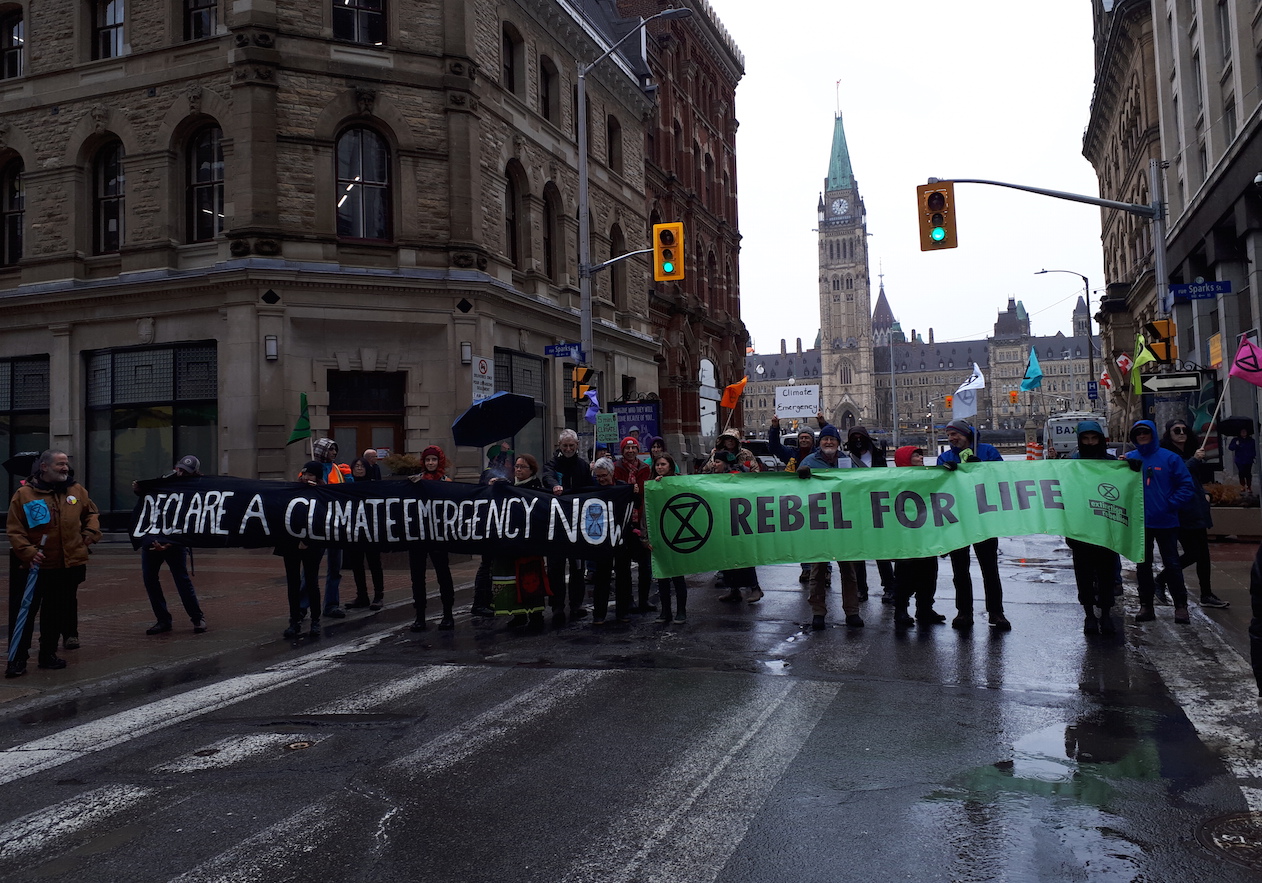On April 15, thousands of Extinction Rebellion conscientious protectors began a blockade and occupation of Waterloo Bridge, Marble Arch, Parliament Square, Oxford Circus and Piccadilly Circus in London, England.
The Guardian reports the action brought “widespread disruption to the capital in a ‘climate rebellion’ that organizers say could last several days.”
That news report adds, “Organizers said they hoped to hold the first four of those venues round the clock over the coming days with a temporary camp established at Marble Arch, causing widespread disruption in the capital.”
Extinction Rebellion Ottawa supported this action across the ocean by blocking four intersections in Ottawa, including Sparks and Metcalfe Streets near Parliament Hill, Laurier and Metcalfe by the city’s main library, and Laurier and Bank, then O’Connor and Gloucester, two busy downtown intersections, before returning to Sparks and Metcalfe 90 minutes later for a final intersection occupation.
The theory of change behind these actions is that activists have tried writing letters to the editor, meeting with their MPs, signing petitions, and rallies, without impact. The belief is that inclusive, non-violent, mass disruptions of business as usual are what is needed now.
The action in Ottawa wasn’t as massive as what is happening in London (more than 120 people had been arrested by the second day of the occupations there), but it was still significant for several key reasons.
Firstly, it was arguably about normalizing direct action as a legitimate political tool. No one likely truly believes that signing yet another petition is going to move the government to action but taking to the streets in an unprecedented way at least has a hope of success. Our numbers need to grow quickly, as does our militancy and endurance, but it can also be a necessary step to stretch before the more vigorous exercise to come.
Secondly, this was an entirely grassroots-organized, volunteer-driven direct action. While environmental NGOs are appreciated, there is a feeling that they are generally behind the curve in the kind of activism needed at this political moment. People are realizing that signing an e-petition and sending a donation with the hope of a mainstream media hit isn’t enough right now. There is a genuine hope that environmental NGOs will lend their resources to this struggle.
And thirdly, the majority of the 43-plus people who blocked intersections in Ottawa were over 50 years of age, were new to non-violent civil disobedience, and have not previously self-identified as activists, but felt compelled given the urgency of the situation and the severity of climate breakdown to take that step off the sidewalk into the intersection.
These are all sparks that need to grow.
It is also notable that while the police stayed a distance back from us, and eventually started diverting traffic away from the intersections we were holding, they did not approach us, ask who the organizer is, or offer “to help us” if we told them our route (we didn’t have a pre-planned route!), all of which is more standard.
Nor was there any group discussion about needing a police liaison. That could represent the beginning of an interesting shift in a broader understanding of who has genuine power (the people) and a withdrawing of consent from those (the police, the state) who use different forms of power and authority against us. Social change has often come about through what has been viewed as unlawful action.
The Extinction Rebellion Ottawa action was a modest beginning that needs to rapidly and dramatically grow across this country to put immense pressure on whatever party wins the October federal election to stop Canada’s role in global average warming exceeding 1.5 degrees Celsius, which is projected to happen as soon as 2030.
But just as every journey starts with a single step, political change can also start with a single step off a sidewalk and onto the street to disrupt business as usual.
Stay tuned, there’s more to come.
Brent Patterson is an activist-blogger who writes this monthly column on inspiring stories of global resistance to neoliberalism and climate change.
Photo by Brent Patterson.
Help make rabble sustainable. Please consider supporting our work with a monthly donation. Support rabble.ca today for as little as $1 per month!





